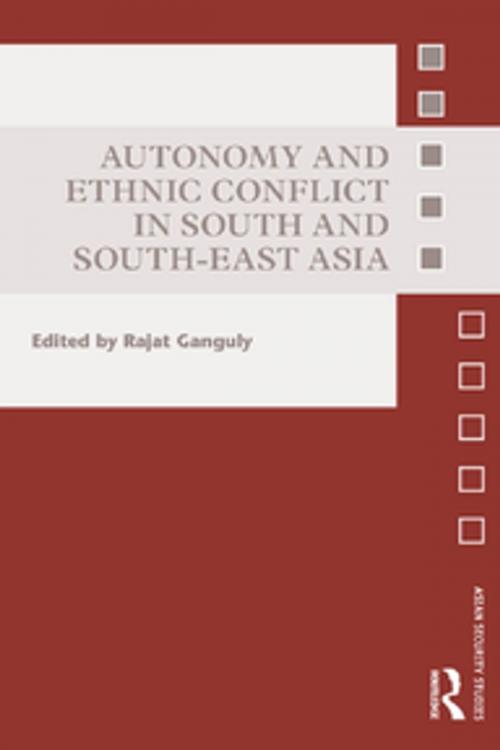Autonomy and Ethnic Conflict in South and South-East Asia
Nonfiction, History, Asian, Southeast Asia, Social & Cultural Studies, Political Science| Author: | ISBN: | 9781136311888 | |
| Publisher: | Taylor and Francis | Publication: | May 20, 2013 |
| Imprint: | Routledge | Language: | English |
| Author: | |
| ISBN: | 9781136311888 |
| Publisher: | Taylor and Francis |
| Publication: | May 20, 2013 |
| Imprint: | Routledge |
| Language: | English |
This book uses empirical evidence from various case studies to examine the relationship between territorial and regional autonomy, the nation-state and ethnic conflict resolution in South and South-East Asia.
The concept of territorial or regional autonomy holds centre stage in the literature on ethnic conflict settlement because it is supposed to be able to reconcile two paradoxical objectives: the preservation of the territorial integrity and sovereignty of the state, and the satisfaction of ethnic minorities’ right to national self-determination. Critics argue, however, that autonomy may not be the panacea for ethnic conflict in all cases.
The contributing authors begin with the concept of territorial or regional autonomy and subject it to a rigorous empirical analysis, which provides reliable evidence regarding the suitability of the autonomy solution to intractable ethnic conflicts. Drawing upon case studies from Kashmir, Assam, Sri Lanka, Aceh, Mindanao and Southern Thailand, this edited volume argues that autonomy arrangements may at best work to resolve only a handful of separatist ethnic conflicts in South and South-East Asia.
This book will be of much interest to students of South and South-East Asia, Asian security, ethnic conflict, peace studies and IR in general.
This book uses empirical evidence from various case studies to examine the relationship between territorial and regional autonomy, the nation-state and ethnic conflict resolution in South and South-East Asia.
The concept of territorial or regional autonomy holds centre stage in the literature on ethnic conflict settlement because it is supposed to be able to reconcile two paradoxical objectives: the preservation of the territorial integrity and sovereignty of the state, and the satisfaction of ethnic minorities’ right to national self-determination. Critics argue, however, that autonomy may not be the panacea for ethnic conflict in all cases.
The contributing authors begin with the concept of territorial or regional autonomy and subject it to a rigorous empirical analysis, which provides reliable evidence regarding the suitability of the autonomy solution to intractable ethnic conflicts. Drawing upon case studies from Kashmir, Assam, Sri Lanka, Aceh, Mindanao and Southern Thailand, this edited volume argues that autonomy arrangements may at best work to resolve only a handful of separatist ethnic conflicts in South and South-East Asia.
This book will be of much interest to students of South and South-East Asia, Asian security, ethnic conflict, peace studies and IR in general.















